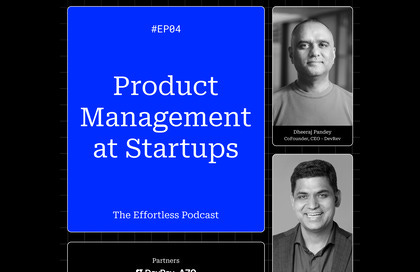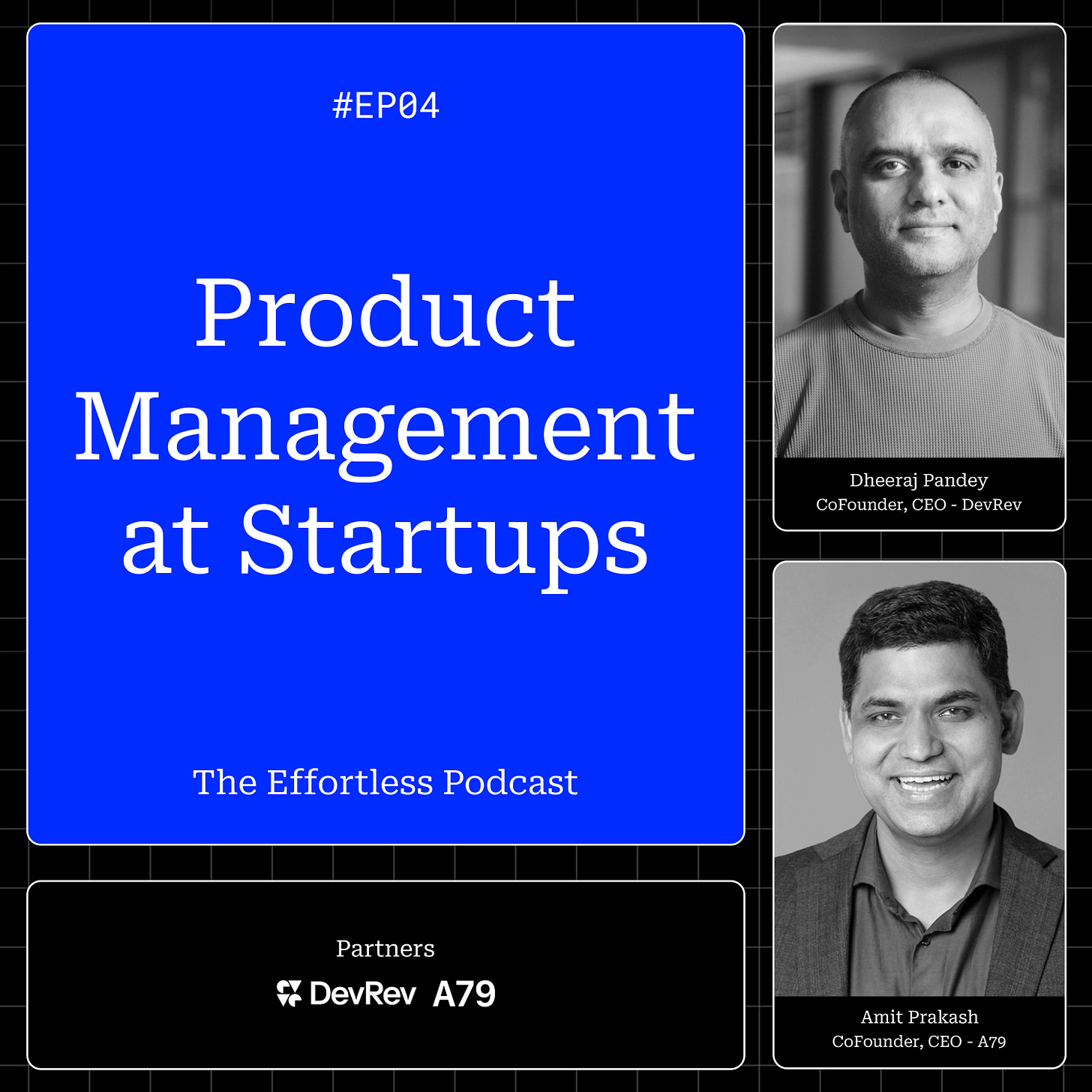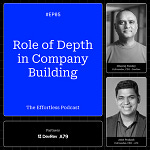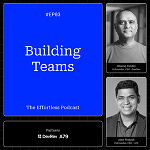Hosts:
Dheeraj Pandey - Co-Founder & CEO of DevRev, former CEO of Nutanix
Amit Prakash - Co-Founder & CTO of ThoughtSpot, former engineer at Google and Microsoft
Summary
In this deep dive, Amit and Dheeraj examine product management in startups, contrasting their experiences at major tech companies like Google and Nutanix with the reality of leading product initiatives in younger companies. Their conversation covers the essential skills and mental models for successful product management, including prioritizing customer empathy, navigating the risks of “negative one to zero” stages, and the importance of building resilience and humility into product design. This episode is a must-listen for anyone involved in startup product strategy, offering insights for PMs at any stage of their journey.
Key Takeaways:
The Evolving Role of Product Management: Startups demand that PMs take on multifaceted roles, often acting as connectors between development, sales, and customers.
Customer-Centric Design Requires Empathy: Understanding the customer experience, even for mundane aspects like upgrades, differentiates lasting products.
Navigating Major Decisions and Risks: Product managers must balance strategic foresight with the humility to pivot, staying adaptable to market trends and customer feedback.
Building Mastery in the Team: Effective products allow users to co-create and customize, ensuring mastery and ownership over the experience.
The Necessity of Lightweight, User-Centric Tools: Ensuring accessibility through lightweight design (often using cloud or SaaS models) can create competitive advantages and enhance adoption.
Navigating Product Market Fit from Day One: Successful PMs must balance conviction in their ideas with responsiveness to market realities.
In-Depth Insights
1. The Essence of Product Management in a Startup Context
Shifting Perspectives: Amit reflects on his initial views on product management as merely process-driven but shares how his experience at ThoughtSpot changed his view. Today, he sees it as the make-or-break function that can influence everything from product-market fit to team morale.
Connecting Customer Experience and Product Execution: Dheeraj emphasizes Nutanix’s unique approach to prioritizing “boring” but essential elements, such as smooth software upgrades, that eliminated downtime and minimized friction for customers.
2. The Art and Science of Balancing Risk
Taking Strategic Risks: Using Snowflake’s decision to be “public cloud-only” as an example, Dheeraj underscores that strategic risk-taking can yield significant dividends when aligned with market needs. Conversely, product decisions that “hedge bets” might dilute the startup’s unique value proposition.
Maintaining Customer Empathy and Resilience: Dheeraj introduces the idea that essentialism (only focusing on the truly critical) can lead to a leaner, more customer-centric approach. For startups, delaying gratification, honing product design, and prioritizing customer empathy are crucial, particularly in difficult economic climates.
3. Finding Product-Market Fit in the “Negative One to Zero” Phase
Crafting a Clear Product Vision: For DevRev, Dheeraj describes how combining a knowledge graph that unites customer and product data has allowed them to streamline customer interactions, while remaining responsive to market demands.
Micro-Pivoting and Listening to the Market: Adapting a mindset of small, iterative adjustments based on customer feedback can help startups stay aligned with market needs. Dheeraj’s team, for example, shifted focus from broader PLG strategies to support-specific tools in response to market shifts in 2022.
4. Empowering Users to “Co-Create”
Balancing Simplicity and Customization: Amit shares how ThoughtSpot’s pivot to allow more expert-driven customization marked a shift in their product strategy, accommodating both novice and advanced users. Dheeraj adds that this co-creation also strengthens customer retention by giving users a stake in the product’s usability.
Creating User Mastery for Product Champions: Providing users with tools to extend and customize their experience fosters ownership, which can significantly improve product engagement and loyalty.
5. Principles of Product Design in Startups
Essentialism and Lightweight Design: Startups should focus on essential functionality, delaying non-core features to preserve simplicity and accessibility.
Continuous Learning for Product Management: Mindfulness practices and empathy-building exercises help PMs maintain customer-centricity. Dheeraj discusses the importance of first-principles thinking, where assumptions are continuously tested against customer needs.
Human-Centric Product Vision: Dheeraj highlights the importance of incorporating a “necessary, sufficient, and efficient” framework in product design, a guiding philosophy for DevRev’s customer and product-centric methodology.
Host Biographies
Amit Prakash
Co-founder and CTO at ThoughtSpot, previously at Google and Microsoft. Amit has an extensive background in analytics and machine learning, holding a Ph.D. from UT Austin and a B.Tech from IIT Kanpur.Dheeraj Pandey
Co-Founder and CEO of DevRev, and former CEO of Nutanix. Dheeraj has led multiple tech ventures and is passionate about AI, design, and the future of product-led growth.
Episode Breakdown
{00:00:00} Reflections on Product Management Misconceptions: Amit reflects on misconceptions about product management and how ThoughtSpot changed his perspective.
{00:00:35} Bay Area Weather Banter: The hosts exchange lighthearted banter about the Bay Area weather.
{00:01:00} “Why Did the Product Manager Cross the Road?”: A joke about slide decks sets the stage for the challenges of PMs.
{00:01:22} Amit’s Early Career at Bing and Google: How distribution-heavy products influenced his initial view of product management.
{00:02:37} Dheeraj on Google Ads Silos: What happens when product management fails to integrate across the user journey.
{00:05:42} Nutanix’s Hits: From control plane ownership to rethinking upgrades and building rolling updates.
{00:08:00} Making “Boring Beautiful”: Why upgrades became a standout feature at Nutanix.
{00:11:00} Nutanix’s Misses: The challenges of retrofitting enterprise-grade capabilities like identity and authorization.
{00:12:26} The SMB Misstep: Why going downmarket failed and lessons learned about packaging and distribution.
{00:19:00} ThoughtSpot’s Journey: Missing the cloud trend and the hard lessons of rebuilding for cloud architecture.
{00:26:13} Defining Products at DevRev: Dheeraj shares the importance of unified thinking and risk-taking in new markets.
{00:34:00} AI-Native Workflows: Rebuilding apps with knowledge graphs and the evolution from “search” to “support CRM.”
{00:36:42} Lightweight Products: The balance between simplicity, accessibility, and creating champions through mastery.
{00:40:00} Empathy for Second-Order Users: How thinking beyond the immediate customer leads to better product design.
{00:45:00} The Curse of Knowledge: Why it’s hard for product managers and founders to maintain beginner empathy.
{00:50:00} Designing for Mastery: Figma, autonomy, and enabling power users to co-create value.
{01:02:00} Governance in ThoughtSpot: Creating opportunities for users to improve the system while maintaining simplicity.
{01:09:00} Conviction vs. Humility: Dheeraj and Amit discuss how founders balance adaptability with staying the course.
{01:14:00} Wrap-Up: Dheeraj emphasizes product management as a tightrope walk and the importance of adapting to external shifts
References and Resources
Books:
Mentioned Companies and Tools:
Key Frameworks Discussed:
MAYA Principle: Most Advanced Yet Acceptable, by Raymond Loewy.
DevRev's Knowledge Graph: Unified customer-product insights for better workflows.
Related Episodes:
This episode offers a rich exploration of product management within startups, stressing the importance of empathy, adaptability, and co-creation in defining product success. Dheeraj and Amit’s perspectives reveal that while conviction in your product vision is crucial, so is the ability to pivot based on customer needs and market realities. For product managers in startups, the balance between strong leadership and continuous market listening remains key to creating products that endure.
Stay tuned for future episodes where they dive deeper into the intersections of product, engineering, and design!












Share this post